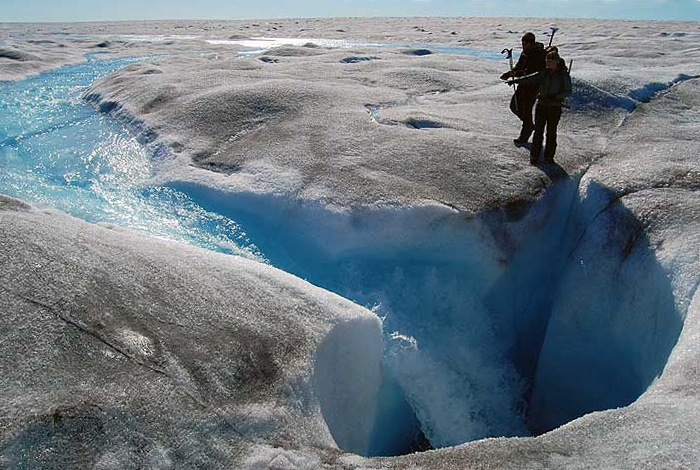We seem paralysed and struck dumb by the monstrous crisis threatening life on Earth.

Scientists observe a stream of meltwater on Greenland’s ice sheet entering a moulin carrying the water to bedrock 700 meters below, where it lubricates the bed and hastens ice sheet movement toward the sea. PHOTO Matt Hoffman, Los Alamos National Laboratory
A couple of bystanders at Manly Beach in the ABC’s revived War on Waste series said all we need to know about our all-too-human response to environmental impact.
Confronted by a tonne of discarded bits of plastic arranged on the sand in the shape of a giant human footprint, a crowd gathered to hear the show’s host, Craig Reucassel, declare that this was the total amount thrown out by Australians “every minute of every day”.
Hearing the news, a woman shuddered, paused for a moment and said she found it “terrifying”, with concern, perhaps fear, in her expression. A tatooed bloke in a singlet said, “you just don’t think about it till you see it put there in front of you”. Indeed, we don’t.
I recently listened to an online talk by British writer-academic Robert Macfarlane about how we cope with knowing that our species has so profoundly impacted the planet that it has passed out of the Holocene and into a new geological epoch, the Anthropocene.
He spoke of his feelings at witnessing meltwater pouring down through cracks in the Greenland ice sheet: a dullness of mind, a sense of being stunned, unable to find words to respond, a thickening or stickiness in thought and speech.
The idea of the Anthropocene, says Macfarlane, is so massive, so stupendous in its implications, so far removed from ordinary human life, that it is beyond our capacity to grieve about it or to find the incentive to spring into action. We’re stunned into silence.
Western Australian philosopher Glenn Albrecht has coined a word, “solastalgia”, for the sense of desolation and powerlessness felt by people at losing a beloved home environment. He calls it “the homesickness you have when you are at home”.
In researching this he interviewed Hunter Valley people who felt powerless in the face of fallout from power stations and large-scale coal mining in their neighbourhood. “Dora” said she lost weight and would wake in the night with her stomach like a clenched fist.
People experiencing the impact of weather extremes also struggle to express their feelings. That much was evident last week in reporting of Australia’s current drought, centred on NSW but felt in parts of all mainland states, as prolonged warm, dry conditions start to bite.
Brian Egan of the farm charity Aussie Helpers says the drought is the worst he’s ever seen. In a wavering voice he told ABC Radio National Breakfast last week that the desolate land and the dead and starving animals seemed “just like a war zone… actually quite frightening.”
He said the impact on farmers was traumatic. His charity’s counselling service was receiving multiple calls daily from farmers suffering anxiety and depression, with “suicidal thoughts”.
From the other side of the Pacific, western United States and Canada, come apocalyptic images of wildfire bearing down on houses, and of stunned residents returning to discover every home in every street, their whole cherished neighbourhood, levelled.
Whatever has triggered our distress – the Anthropocene, a coalmine, wildfire, drought, flood, famine, contagion or war – the common thread is a sense of helplessness and hopelessness that clouds our thinking and makes words hard to find.
Some of these happenings are not direct outcomes of our impact on nature. But no-one in the world is untouched by what is happening to air, oceans and lands – our life support system.
Technology has done much to improve our lives, but it has also put up a barrier between us and our natural world. The world’s richer people now have homes and cars with their own micro-climates, and we can criss-cross the planet with little disruption or discomfort.
Our use of technology has raised the stakes. While dulling our sense of place it has massively multiplied our impact on the biosphere, allowing us to avoid responsibility for that impact.
Our conspicuous consumption follows primitive urges, like chronically obese people who can’t stop eating, but now we’re ravaging the whole planet. It’s way past time we rediscovered the nurturing part of our nature, the part that recognises the value of caring for our home.
We need Reucassel and Macfarlane and others to continue shining lights into dark corners of our war on nature. But if we really want a safer future we must look to ourselves, all of us, together.
Australia seems paralysed by this crisis. Our national government cannot or will not articulate the dangers we face. Perhaps it is afraid to. Perhaps it too is afflicted with Macfarlane’s sticky speech.
Glenn Albrecht got it right. He invented another word, “soliphilia”, which involves cherishing our connection to place, and in solidarity with others, being willing to accept political responsibility for the health of Earth, the planet that is our home.
Solidarity arises from another natural trait, community. Humans are social animals who work best together. When enough of us stand up and say “enough”, but only then, things will start falling into place.
